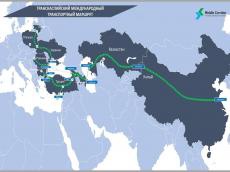|
|
TODAY.AZ / Business
Kazakhstan Railways offers opportunities on TITR for foreign ambassadors
11 April 2024 [19:15] - TODAY.AZ

Kazakhstan Railways (KTZ), a state enterprise, hosted a meeting with international diplomatic missions to discuss the construction of the Trans-Caspian International Transport Route (TITR, or Middle Corridor), Azernews reports.
Over 30 foreign ambassadors, as well as representatives from the EBRD and the World Bank, were briefed on the Middle Corridor's benefits and opportunities, the route's development results, and prospects for international cooperation, as well as the results of Kazakhstan's railway industry in 2023.
The KTZ reports that container transit via Kazakhstan has increased 4.7 times in the last ten years. At the end of last year, the volume of transit traffic exceeded 27 million tons, which has historically been the company's strongest indicator.
At the same time, the volume of cargo moved through TITR nearly doubled in 2023 compared to 2022, reaching over 2.8 million tons. The expected volume for TITR in 2024 is 4 million tons. In the medium future, up to ten million tons.
Participants were also briefed about KTZ's active work to strengthen the "soft and hard infrastructure" of TITR in order to improve logistics services both within and outside of Kazakhstan.
Andrei Mikhnev, the World Bank's Country Manager for Kazakhstan and Turkmenistan, spoke at the occasion and stated that the WB's report gave an examination of alternative solutions that will help triple the current volume of freight traffic on the TITR.
The Middle Corridor is a transportation and trade route that connects Asia and Europe, passing through several countries in the region. It is an alternative route to the traditional Northern Corridor and Southern Corridor.
The route starts in China and crosses Central Asian countries such as Kazakhstan, Uzbekistan, and Turkmenistan. It then passes through the Caspian Sea, Azerbaijan, Georgia, and Türkiye before reaching Europe.
The Middle Corridor offers a land route that connects the eastern parts of Asia, including China, with Europe, bypassing the longer maritime routes.
URL: http://www.today.az/news/business/247027.html
 Print version
Print version
Connect with us. Get latest news and updates.
See Also
- 21 February 2025 [15:47]
SCSIS introduces accessibility module for people with disabilities - 21 February 2025 [14:16]
AI-driven cyberattacks increasing security challenges, warns Azerbaijani official - 21 February 2025 [12:00]
V Summit of IT leaders in Baku focuses on growing cybersecurity threats - 21 February 2025 [11:03]
Azerbaijan Railways ensures passenger safety amid adverse weather - 20 February 2025 [10:42]
Azerbaijan to showcase tourism at "TourismA" exhibition in Florence - 18 February 2025 [15:21]
2025 Agrarian Business Festival to kick off in Imishli - 18 February 2025 [13:18]
Azerbaijan, Qatar central banks discuss strengthening cooperation - 18 February 2025 [12:43]
Shah Deniz Compression Platform to be Azerbaijan's 1st unmanned facility - 17 February 2025 [13:19]
Caspian Economic Forum kicks off in Tehran with regional trade and transport on agenda - 17 February 2025 [12:21]
Azerbaijan and IsDB discuss expanding cooperation in Islamic finance
Most Popular
 Non-Russians of Karabakh as a tool in the information war against Baku
Non-Russians of Karabakh as a tool in the information war against Baku
 Turkiye strengthens energy role with Turkmen gas agreement
Turkiye strengthens energy role with Turkmen gas agreement
 Erdogan calls Istanbul talks important platform for parties to reach consensus
Erdogan calls Istanbul talks important platform for parties to reach consensus
 Hikmat Hajiyev meets with Israeli Prime Minister Netanyahu
Hikmat Hajiyev meets with Israeli Prime Minister Netanyahu
 Azerbaijan, Iran discuss strengthening parliamentary ties and regional cooperation
Azerbaijan, Iran discuss strengthening parliamentary ties and regional cooperation
 President Ilham Aliyev visits Khankendi garment factory
President Ilham Aliyev visits Khankendi garment factory
 Azerbaijan’s firm stance dispels myths of pro-Russian allegiances
Azerbaijan’s firm stance dispels myths of pro-Russian allegiances
